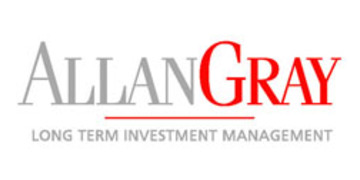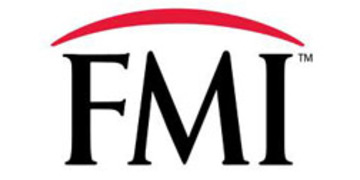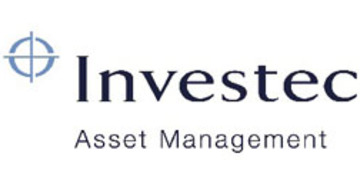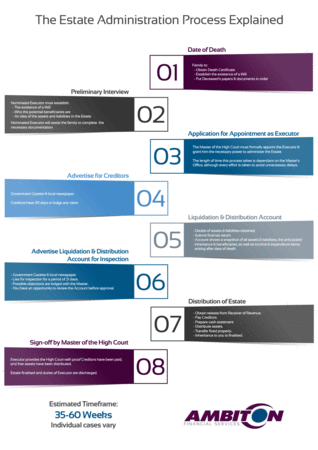Wills & Estates
Estate planning is the process of anticipating and arranging during your lifetime for the disposal of your estate after your death. Estate planning typically attempts to eliminate uncertainties over the administration of your estate and maximize the value of your estate by reducing taxes and other expenses. Estate Planning involves instruments such as life policies, your Last Will & Testament, trusts, beneficiary designations, living wills, etc. More sophisticated estate plans may even cover deferring or decreasing estate taxes or winding up a business.
Even though Estate Planning is vital, it is often neglected as an important element in one’s financial planning process. An Estate Plan does not only include measures that come into effect at the death of the owner of the estate but there are also planning aspects that may be put into effect during the lifetime of the estate owner.
A common misconception about estate planning is that it revolves solely around life assurance policies. This is incorrect as, although life policies are often taken into account, comprehensive planning involves the structuring of wills, trusts and donations. Issues such as marital contracts, CGT and income tax all need to be taken into account.
Estate planning essentially involves structuring your personal financial affairs in such a way that, upon your death:
- estate duty is minimized
- there is sufficient liquidity to meet the estate's financial obligations
- inheritances are sufficiently protected for your heirs
To reap the full benefit of good estate planning and to avoid the many luring pitfalls it is essential to obtain advice from a skilled specialist or an advisor with access to such a specialist.
Preparation of your Last Will & Testament
Your Last Will & Testament is one of the most important documents to be drawn up during your lifetime as it contains your final wishes about the assets you have accumulated over the years. But, above all, it represents financial peace of mind to those you leave behind and are financially responsible for.
Living will
A living will is an advance document reflecting a person's wishes regarding the type of medical care he or she would, or would not want, should they ever be without the mental and physical capacity to communicate his or her needs, especially where there is no hope of recovery or significant improvement. One of the most important roles of a living will is that it may be the only written evidence of what a person's wishes are in such a critical situation.
Trust Creation & Administration
There are several different types of trusts that you can create - the most important being:
- inter vivos trust – a trust created while you are still alive
- mortis cause trust or a testamentary trust – a trust created from your Will after your death
A trust is an agreement between an owner of assets and trustees whereby the trustees undertake to administer, objectively manage and control the trust's assets with the necessary care to the benefit of the beneficiaries. It is an efficient and flexible method to ensure that wealth earned by an earlier generation stays within the family.
Ambiton has many years of experience in setting up such trusts to help protect your assets. Our expert services include the drafting, registering and ongoing administration of trusts.
Estate Administration
Losing a family member is one of the most difficult situations we will ever face in life. Apart from having to deal with feelings such as grief, loneliness and a general sense of loss, the practical realities of concerns about money, financial security and the future of the deceased’s possessions, might become a heavy burden to bear. The administration of an estate is not a straight forward exercise as there are many complexities which may arise.
But don’t fear - AMBITON can help. Our professional team of experienced and qualified specialists will ease the burden of estate administration.
Whether -
- AMBITON has been nominated as executor in terms of a will,
- a family member has been nominated as executor and requires assistance, or
- even if the deceased did not leave a will at all,
we can help you through this difficult time.
Our Promise
You can trust AMBITON with
- Planning the financial security of your loved ones after your death.
- Making certain that your specific wishes are correctly set out in your Will - tailored to your specific circumstances.
- Ensuring prompt and effective administration of the estate once you have passed away.
- Safekeeping critical documents, such as your Last Will & Testament, during your lifetime.
An Overview of the Estate Administration Process Explained
Date of Death
Family to: Obtain Death Certificate / Establish whether a Will exists / Put the deceased's papers and documents in order
Preliminary Interview
Nominated executor must establish: Whether a Will exists / Who potential beneficiaries are / An idea of the assets and liabilities in the estate / Nominated executor will assist family to complete the necessary documentation
Application for appointment as Executor
The Master of the High Court must formally appoint the executor and grant him the necessary powers to administer the estate / The length of time this process takes is dependent on the Master’s Office, although every effort is taken to avoid unnecessary delays
Advertise for Creditors
Government Gazette and Local paper / Creditors have 30 days to lodge any claim
Liquidation & Distribution Account
Details of assets & liabilities obtained / Submit final tax return / Account shows a “snapshot” of all assets and liabilities, the anticipated inheritance and beneficiaries, as well as income and expenditure items arising after date of death
Distribution of Estate
Obtain release from Receiver of Revenue / Pay creditors / Prepare Cash Statement / Distribute assets / Transfer fixed property / Inheritance to you is finalised
Sign off by Master of High Court














